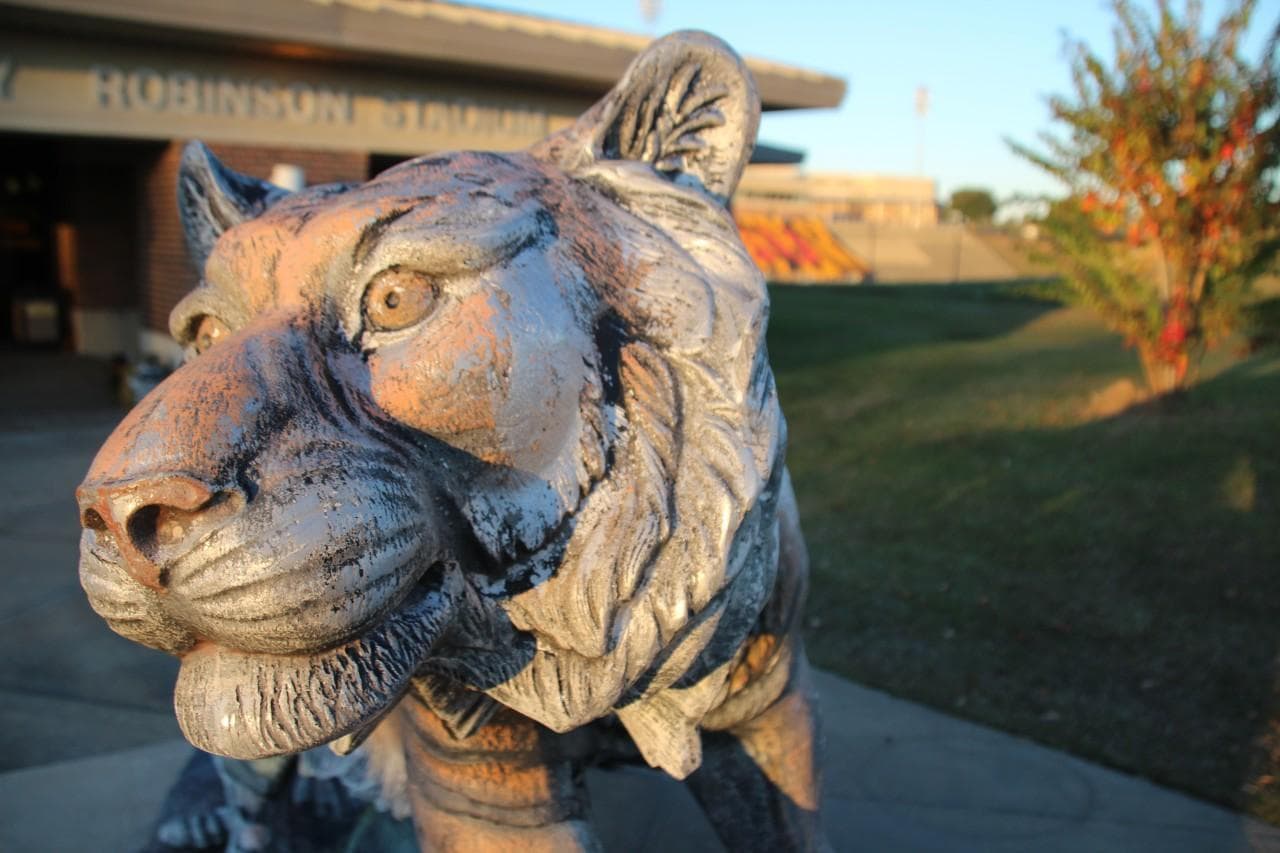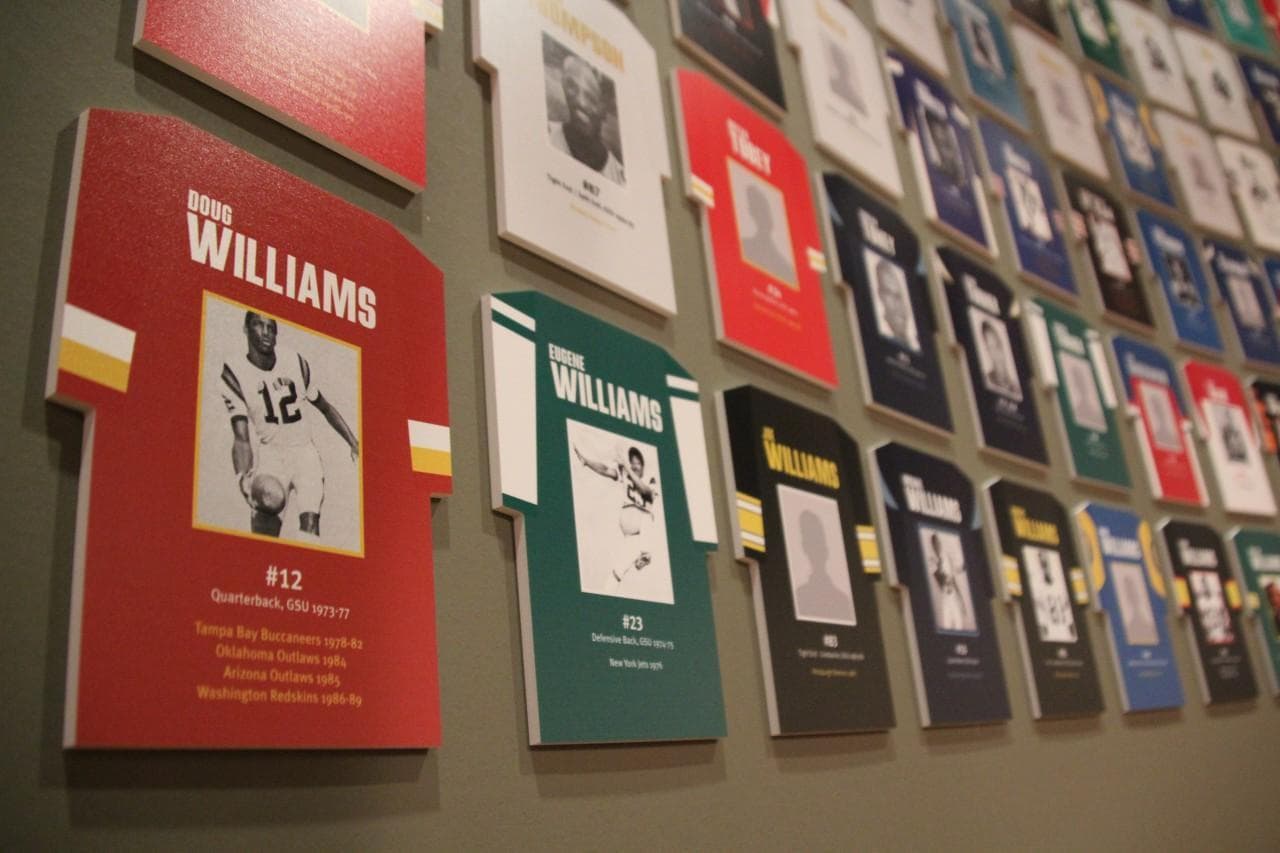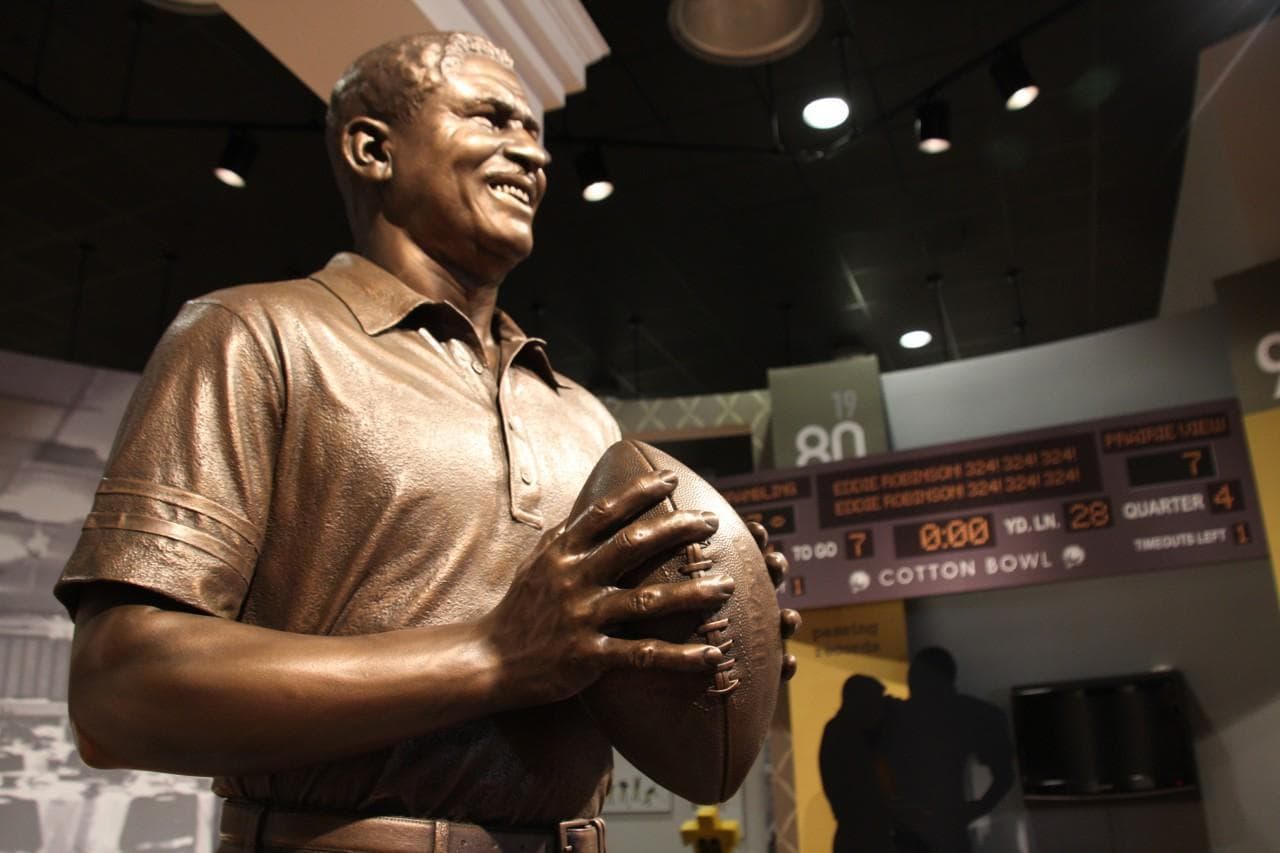Advertisement
Feature
Grambling Tigers Struggling To Survive
Resume
It’s not hard to hear the echoes of Eddie Robinson at Grambling. His name is on the stadium. The pictures of his players — many NFL greats — deck the halls. And, of course, there’s the Eddie Robinson Museum, with the statue, a replica of his home office and even his old Rolodex.
"When you turn through the Rolodex, you see the names and numbers of celebrities of the time. It goes on and on. I mean, worldwide figures. And this was just sitting on his desk. He knew everybody in the world who was somebody.”
That was Jon Moss the museum manager, the keeper of all things great and good about Eddie Robinson. Between 1941 and 1997, the former feed mill worker won 408 football games — most all-time in Division I. But more impressive, he turned Grambling — a small, rural Louisiana outpost — into a national brand.
Doug Porter, an assistant coach under Robinson for eight years, can pinpoint the exact moment it happened. It was 1968, at Yankee Stadium. Grambling lost to Morgan State 9-7, failing to score at the goal line as time expired, before 60,811 screaming fans. And Robinson couldn’t believe it.
“He started planning for the next year’s game right away," Porter said. "He said, ‘We can’t let this happen ever again, coming to New York and losing like this.’ And during the time I was here, we never lost again in New York.”
The story seems to say everything about a man whose voice can still be heard in speeches, playing on an endless loop in the museum at Grambling.
After Eddie Robinson
By the 1990s, though, much was changing. Sports editor O.K. “Buddy” Davis has covered Grambling since 1965 for the Ruston Daily Leader. He was there in Yankee Stadium in 1968. And he was also there at Grambling in 1997 when Robinson retired.
“I can see it like it was yesterday," said Davis. "They might have had 3,500 fans in their stadium. It was really an embarrassment. And if you knew Coach Robinson, and what he had done and the kind of person, you just had to feel sorry and bad about it, that he couldn’t have gotten a bigger sendoff. That was his last home game.”
There have been some good years since then, six conference titles. Now Grambling has reached a new low. In September, the university fired head coach, Doug Williams: a former Grambling All-American under Robinson and a Super Bowl MVP in 1988.

The decision had nothing to do with his record. The university was concerned Williams’ supporters, raising money to help the program, weren’t following the proper protocols.
Players were upset. The losses continued to mount. By mid-October, the Tigers were 0-7. And so, when university president Frank Pogue came to talk to the players, many walked out.
“When they made a decision to stand and leave, I wasn't surprised about that at all," said Pogue. "But I did not see that as a sign of disrespect to Frank Pogue — no, sir.”
The Protest Continues
Pogue is 75 years old and a son of the civil rights movement, raised in Alabama. He can appreciate marches and sit-ins.
“I sat at lunch counters," said Pogue. "I had ketchup splattered all over my suit and my face — in protest.”
But this protest caught Pogue by surprise. For two days, the players refused to practice. Then they refused to get on buses and play Jackson State University on October 19. Pogue had no choice: He called Jackson State to forfeit.
“You got buses over here. And you got a ride to make. You got Jackson State over there, waiting on homecoming, man. I just waited until the very last minute. That’s the most difficult phone call I've ever made in my whole life.”
School officials estimate the boycott will cost Grambling more than $300,000 in fines and other fees. The players themselves weren't permitted to speak for this story. But at the time of the boycott, they made it clear: they felt good about their decision.
“To get what we felt was right, we had to take a stand, to make sure our voice heard. We have no regrets," said Grambling State safety Naquan Smith.
They wanted to air their complaints about broken floor tiles in the weight room, staph infections, leaky ceilings, moldy rooms, and long bus rides to away games in Kansas City and Indianapolis.
The university responded by replacing the weight room floor, reassigning the coach who replaced Doug Williams, and handing the job to defensive coordinator Dennis “Dirt” Winston — Grambling’s third head coach in seven games.
Not much could be done, however, about the money. Grambling’s athletic budget is almost half what it was five years ago. But then, just about every department is facing financial shortfalls.
Problems Beyond Football
In the past five years, the state of Louisiana has gutted Grambling’s funding by 56 percent. The university has hiked tuition rates to close the gap. And still it’s not enough. The campus library is so poor many students go to Louisiana Tech’s library nearby to study. Buildings can’t be fixed; Grambling is facing $65 million in deferred maintenance. New professors can’t be hired. And those who are there haven’t received a raise in six years.
Connie Walton is Grambling’s provost and vice president of academic affairs. So while others are worried about touchdowns, she’s worried about classrooms.
“No cost of living. No merit increase. So for faculty who are really outstanding in their certain area, no increase — not a penny increase in their salary," said Walton.
It’s a familiar story at state schools across Louisiana. But it’s hard for many to accept that the boycott, cutbacks and strife are happening at a school still best known for Eddie Robinson.

“Put it this way: Had he been alive, this wouldn't have happened,” said Porter.
Porter, Robinson’s old fellow coach, is concerned about Grambling’s future. What top athlete would want to go there now? But athletic director Aaron James is more optimistic.
“Even in the midst of the storm, a young man committed to us, verbally committed, out of Ville Platte, a quarterback," said James. "And everybody asking me, ‘How d’yall get this kid to commit?’ And I have one answer: We Grambling. That’s the bottom line.”
More than 70 people have applied for the head coaching job to be filled this winter. And next Saturday, Grambling is back on national television at the Bayou Classic in New Orleans. Grambling versus Southern University, with the marching bands and the crowds. Eddie Robinson’s kind of game, with a twist this time. There will be ads during the game asking fans to text $10 to Grambling, to help.
This segment aired on November 23, 2013.